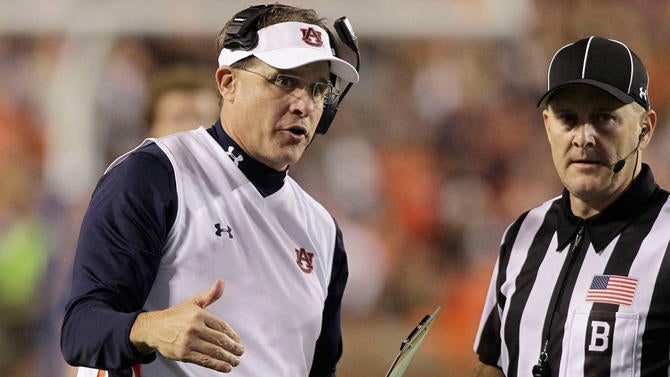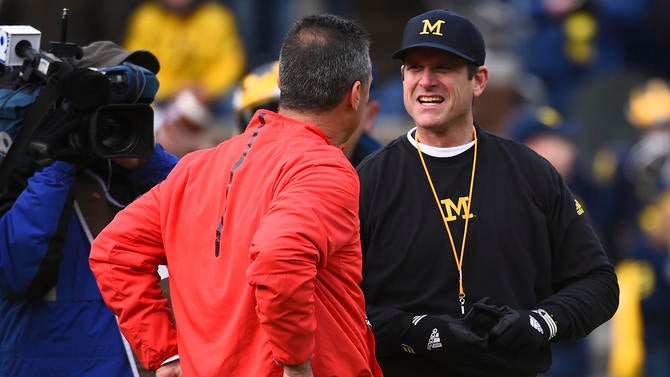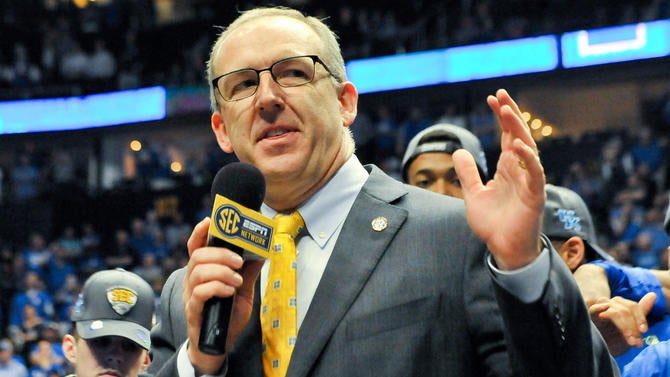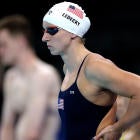The Big 12 is considering expanding to add a TV network and football championship game. The ACC keeps working with ESPN to start a network. The Pac-12 makes less money than members initially expected from its network.
Meanwhile, life is simpler for the SEC and Big Ten. They have the money, the exposure and the first two College Football Playoff national titles.
Compared to other conferences, there won't be as many dramatically big questions when the SEC convenes this week for its spring meetings in Destin, Florida. Still, even as the SEC counts its record amounts of money, these are some issues facing the conference in no particular order.
1. NCAA violations/legal problems. This hasn't been a good offseason image-wise for the SEC. Ole Miss, already under NCAA investigation, saw star player Laremy Tunsil admit publicly at the NFL Draft that he got paid by Rebels coaches. Coach Hugh Freeze, whose program has four Level I violations under his watch, is trying to avoid being deposed in a lawsuit brought against Tunsil by his stepfather. It's a deposition the NCAA could theoretically use in its case against Ole Miss.
Alabama defensive line coach Bo Davis abruptly resigned recently because he was dishonest when accused of visiting multiple out-of-state recruits during a dead period for contact, according to AL.com. It's not every day an assistant resigns out of the blue from the defending national champions.
Tennessee is fighting a Title IX lawsuit that alleges the university created an environment that enabled sexual assaults by athletes, especially football players. The suit alleges that Tennessee coach Butch Jones told a player he "betrayed the team" by helping a woman who said she was raped by two other Tennessee players, an accusation Jones has denied.
Mississippi State is still mum on the status of five-star recruit Jeffery Simmons, who was charged with simple assault. A video surfaced in March showing Simmons hitting a woman on the ground.
"You cited four or five (negative stories)," SEC commissioner Greg Sankey said. "There have been hundreds, if not thousands, of great stories around this conference. While we're not perfect, we do things exceedingly well and young people can receive an education and have tremendous success here. When there are issues that deal with the legal system, we have the legal system deal with those. When there are enforcement issues, we have conference policies on how we interact as a conference office and how schools should deal with those appropriately."
When Ole Miss' women's basketball recently served a postseason ban, it marked the SEC's first such ban due to NCAA violations since 2004. Only the Big 12 and MAC had gone longer without one of its universities receiving a postseason ban. When he took over last year, Sankey laid out a goal of no SEC team becoming ineligible for the postseason or vacating past championships.
"We've had incredible success over the last 10 to 15 years, and we have not been returning trophies and vacating championships," Sankey said, "and we need to all focus on that collectively."
2. Redefining SEC player misconduct rule for transfers. A year ago in Destin, the SEC created a league rule prohibiting transfers who had been subject to university or athletic department disciplinary action for domestic violence, sexual assault or other forms of sexual violence. A new SEC proposal that will be considered this week would expand the definition to include any transfer who has been convicted, pled guilty or pled no contest to a felony involving serious misconduct.
In addition to the SEC's definition of "serious misconduct" from last year, the league is proposing it also includes "dating violence or stalking, or conduct of a nature that creates serious concerns about the safety of others." In other words, the SEC transfer ban could expand to include violence or threats against men, not just women.
The proposal also calls for all SEC schools to conduct an "appropriate inquiry" into a transfer's background prior to offering the athlete a scholarship. SEC schools would be required to ask transfers if they have pending criminal charges, and convictions or guilty/no-contest pleas related to sexual violence, possession of a firearm, dating violence, stalking and any felonies. Transfers would also be asked if they have tried to inflict serious harm against someone, been disciplined for any reason at a previous college, and whether he or she was subject to a pending disciplinary proceeding at the old college that could have resulted in suspension, expulsion or probation.
Sankey said the SEC rule won't expand to include bans against incoming freshmen involved in violent behavior, at least not now. Simmons' case at Mississippi State following his arrest falls into that category. Player misconduct by incoming freshmen is "something that may be more of a youthful mistake, and I think our universities are capable of handling those decisions independent right now of a conference rule, and that's actually been verified by our working group," Sankey said. "It was a good topic of conversation, but at the moment the focus is on transfers."
The SEC rule does allow a waiver process if new information surfaces about a player's misconduct and a school wants to add the transfer. "I don't know that we had a waiver in the first year," Sankey said. "Where circumstances were present and someone encountered the rule that would prevent a transfer from participating, our universities moved on to the next prospective student-athlete."
3. SEC football divisional imbalance. Auburn coach Gus Malzahn made some waves in April when he told ESPN's Chris Low he thinks "there will be a discussion" about the Tigers changing divisions to the SEC East. The SEC quickly shot that down and said there has been no discussion of divisional realignment. Two years ago, SEC schedules were set through 2025.
But when asked several times last week, Sankey wouldn't say if there are discussions of realigning divisions. The West has seven straight SEC championships and has won 70 percent of games against the East since 2009.
Kentucky's Mark Stoops and Tennessee's Butch Jones enter their fourth seasons as the longest-tenured SEC East coaches. Advanced stats by Bill Connelly found the SEC East in 2015 was by far the worst division among the Power Five conferences. The SEC East was rated closer to both divisions in the American Athletic Conference and Mid-American Conference than it was to the SEC West.
"It is cyclical," Sankey said. "We've had great competition in divisions for nearly 25 years and we expanded and we've kept divisions, and we look forward to our division champions to continue to meet in Atlanta for the SEC Championship Game."
So does that mean there's no talk of realigning divisions? "Just exactly what I said," Sankey said.
Right, but there have been stories with people floating ideas. So is there actual talk within the SEC of possibly realigning divisions? "I see stories as well," Sankey replied.

4. The state of SEC men's basketball. In three of the past four years, the SEC has put only three teams into the NCAA men's basketball tournament. Sankey hired former Big East commissioner Mike Tranghese to be a basketball advisor. He will be in Destin to meet with SEC athletic directors and coaches.
On the surface, the SEC has appeared to make some better coaching hires in recent seasons: Frank Martin at South Carolina, Bruce Pearl at Auburn, Rick Barnes at Tennessee, Avery Johnson at Alabama, and Ben Howland at Mississippi State. Still, LSU didn't make the NCAA Tournament despite having Ben Simmons, the nation's No. 1 recruit last year. Highly-recruited Mississippi State player Malik Newman is already considering a transfer after one year with Howland.
For years, the SEC has crunched RPI numbers to try to get more NCAA Tournament teams. There's a thinking within the conference that Tranghese's mission is different: Find a way to build a better SEC basketball culture that improves the quality of the teams. Sankey also needs to hire a new associate commissioner for men's basketball after Mark Whitworth left for a job at a sports marketing firm in Birmingham, Alabama.
5. Centralized replay in football. The SEC will experiment in 2016 with centralized replay, a collaborative effort between the conference office command center and the replay official at a game. SEC coaches had pushed for a joint effort on replay and the NCAA is allowing the experiment for the first time.
Destin will offer the first chance for SEC coaches to hear the procedures. Fans will inevitably go nuts with conspiracy theories when a call goes against them. But it's not like they don't do that now anyway. More eyeballs -- and the right set of eyeballs -- on close calls are a good thing if it's executed properly.
"We're in pretty good shape with how the system is going to work," Sankey said.
6. SEC vs. Big Ten recruiting model. The SEC's push to ban satellite camps nationally succeeded and then failed. So Jim Harbaugh is on the road again this summer. For the first time, SEC coaches are also holding satellite camps, even though Sankey said he remains concerned with the proliferation of camps designed only for recruiting. The NCAA Board of Directors gave the NCAA Council until Sept. 1 to make initial recommendations on the entire recruiting model, including satellite camps.
"I think the Board of Directors was clear in its press release when it changed the course on satellite camps that it identified concerns around those activities," Sankey said. "We have in Division I a rule in basketball that does essentially what was proposed in football because of concerns around those camps. I'm hopeful that with the Football Oversight Committee's recruiting subcommittee they can be attentive to enhancing the health of the recruiting culture. But it's important to start with exactly what concerns may exist and people identify those concerns clearly."
In a way, this issue is a SEC vs. Big Ten debate, even though the recruiting model impacts everyone. Big Ten commissioner Jim Delany has previously said satellite camps should be discussed within the context of early signing, early recruiting visits, over signing, and the epidemic of decommitments and grayshirting. At the Big Ten meetings this month, the conference was short on specifics about how to change recruiting.
"I think the recruiting calendar has worked well," Sankey said. "If there's a desire to add to the spring evaluation period, I think that should be identified and discussed. If there's an interest in making spring evaluation a contact period because there are concerns about impermissible contact in high schools or a desire to have more contact with young people, that should be identified and discussed. We certainly want to make opportunities available to young people, but we think we can do that essentially through the recruiting framework that's there and focused on the scholastic setting, not satellite camps."

7. Passing athlete benefit rules with Power Five. Time demands, transfer rules, the NCAA's new revenue distribution ideas, medical insurance, player safety and other issues will get discussed in Destin. But as I've written before, Power Five autonomy has created a small subset of NCAA dysfunction even as external threats challenge these conferences. Sankey, who was a key architect in creating Power Five autonomy in 2014, said the major conferences have improved their dialogue lately to determine how to better develop ideas independently, share them with other conferences, and establish deadlines for proposals and discussion.
"I think there's lessons in how we came to this existence of an autonomy governance structure," Sankey said. "There was a year-and-a-half where there was regular communication among the five conferences, good ideas were shared, there was give-and-take. There wasn't a lot of people issuing press statements on what the governance structure should look like under an autonomy concept. I think what's happened since that time, we've all become siloed. We all have our own thoughts and motivations."
One idea Sankey is cautious about: The Division IA Athletic Directors' Association's attempt to use its collective purchasing power to reduce medical insurance costs on athletes.
"I think they have some work to do to determine details and how it functions," Sankey said. "The good news is they've decided that's a project they'd like to pursue."
8. SEC athletes' voices in decisions. In a new twist for the SEC, five athletes are going to participate during portions of this week's meetings: Arkansas women's tennis player Flavia Arajo, Ole Miss baseball player Brady Bramlett, ex-Mississippi State football player Jay Hughes, Tennessee women's basketball player Diamond DeShields, and Texas A&M swimmer Antoine Marc. Three of them are the SEC's representatives for NCAA autonomy voting. Sankey described the athletes' presence this week as a "voice opportunity" for them with administrators.
The SEC plans to create athlete leadership councils to engage players' ideas. What this doesn't signify, at least not yet, is SEC athletes having votes on conference issues, as the Pac-12 now allows.
"That's not developed yet -- not to say it will or won't," Sankey said. "One of the challenges is given the seasons and schedules, how do you interact with football and men's and women's basketball student-athletes? We've been intentional about wanting to implement something that is fresh and that's sustainable."

















